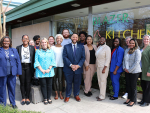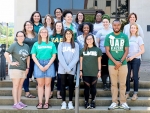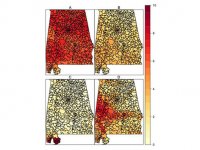Displaying items by tag: department of environmental health sciences
While it has long been thought that the most direct health effect linked to the sanitation crisis in the Black Belt was due to soil-transmitted hookworm, a study led by UAB found no evidence of transmission.
Tagged under
Whether for pool trips or beach vacations, follow these tips on how to keep children safe in and around water this spring break.
Tagged under
Lexie Woolums, an Honors College and Environmental Sciences student at UAB, has been selected to join the first cohort of the Obama-Chesky Scholarship for Public Service, or Voyager Scholarship.
Tagged under
The University of Alabama at Birmingham has been awarded an American Rescue Plan grant to help serve food to insecure populations.
Tagged under
Tagged under
- release
- office of the president
- office of the provost for student and faculty success
- uab strategic plan
- school of medicine
- college of arts and sciences
- oneal comprehensive cancer center
- school of public health
- department of medicine
- division of infectious diseases
- department of surgery
- department of biochemistry and molecular genetics
- department of clinical and diagnostic sciences
- department of microbiology
- department of pharmacology and toxicology
- division of cardiovascular disease
- division of endocrinology diabetes and metabolism
- department of psychology
- department of environmental health sciences
The RURAL Heart and Lung Study clinic will bring to rural communities technology that provides access to diagnostic tests that are not routinely done in rural settings. UAB researchers will examine medical, lifestyle and behavioral factors that contribute to higher health concerns in residents of Dallas and Wilcox counties.
Tagged under
The tuberculosis bacteria induce increased hydrogen sulfide production by human macrophages, which increases pathogenesis.
Tagged under
Aberystwyth University in Wales partners with UAB to create an opportunity for students to learn more about the historic partnership and Wales’ culture.
Tagged under
George Luber, Ph.D., is the former chief of the Climate and Health Program at the Centers for Disease Control and Prevention.
The RURAL Study will allow researchers to learn what causes the high burden of heart, lung, blood and sleep disorders in Alabama, Kentucky, Louisiana and Mississippi.
Tagged under
Students will visit a site where nuclear weapons were once tested, the nation’s first quarantine station, the lower Ninth Ward in New Orleans and many other sites around the Southeast.
Tagged under
Tagged under
In a sedentary office environment, participants working in 78° to 80°F temperatures consumed nearly 90 fewer calories than those in a cooler environment.
Tagged under
The American Industrial Hygiene Association honors Elizabeth H. Maples, Ph.D., for her extraordinary contributions.
Julia Gohlke, Ph.D., received the F. Clarke Fraser New Investigator Award for cutting-edge research related to birth defects and other disorders of developmental origin.
UAB researchers, a National Weather Service office and the state public health department seek to design an alert system that better protects public from extreme heat.
The goal of the grant is to develop a new technique based on nanomaterial sorbents that allows accurate sampling of gases and vapors at low levels for measuring workers’ exposure.
Get the scoop on radon Jan. 16.

















